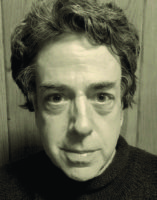The 2016 Writers Harvest welcomes poet David Sanders, along with writers Gwen E. Kirby, Dinty W. Moore, and Kathryn Nuernberger, for a reading on Thursday, Sept. 22, at 7:30 p.m., in the Walter Hall Rotunda; $5 suggested donation.
By Morgan Cappel, intern for the Office of Special Programs
Here, she offers an overview of Sanders’s latest work

David Sanders
David Sanders is the founding editor of Poetry News in Review and worked, here, at Ohio University, as the director of Ohio University and Swallow Press, where he organized the respected Hollis Summers Poetry Prize. He received his MFA from the University of Arkansas, and his work appears in two limited-edition collections—Nearer to Town and Time in Transit.
Sanders’s newest book of poems, Compass and Clock, was written over a period of thirty years, and if the poems themselves do not speak volumes to you—which, they do, although quietly, to me—at least this fact should. In his work, Sanders has turned back to impressions that mean something thirty years forward, poems that, in fact, feel timeless, poems that concern the very simple pleasures of existence in this world. This is a poet who has something to say about way we live, then and now.
Sanders is often considered a formal poet, but form does not, in any way, overwhelm his incisive poetry. His method, then, is merely an aid or complement to his language. He employs some structural devices where they might enhance, but he abandons them otherwise—Sanders does not permit form to stand in his way.
In some of his poems, he has curiously chosen to adopt forms that his audience might recognize as old-fashioned, but he’s given them new life. His language alone, though, is so artful that form sometimes goes unnoticed; yet, upon a second reading, the reader perceives the form, and the poem becomes much more complex. “Here, Now,” is one of these poems.
My first reading of “Here, Now” revealed a speaker watching some punk rockers and thinking of himself at their age. On the page, the poem is short, and when I read that opening line—“A group of young punk rockers congregates”—I did not identify the form right away. However, when I turned to the poem a second time, I counted fourteen lines, separated into an octave and a sestet.
And the poem does, in fact, work in the same way as the most celebrated sonnets in literary history. It begins with a group of adolescents, characterized by their “lust” and “nonchalance,” and ends with a change in tone, a reversal of our expectations. Instead of passing judgment on their immaturity, the speaker recognizes something in them that he has perhaps lost:
Instead I watch them, knowing how I cursed
the Ohio sky that kept me from the wild,
And how I made it seem like somewhere else
with all that one garage band could call forth,
without imagining it would come to this,
for all that it was and wasn’t worth.
Yes, Sanders has given us a sonnet—the most formal of forms—about punk rockers. That playfulness characterizes Sanders’s work, but he’s never gimmicky.
But, for the big, archaic forms he takes on, and the ambiguities about human existence he confronts, Sanders’s poetry is not loud or inflated. Rather, his language is quick, precise, and modest. What might sound harsh if composed by another poet is depicted quietly in Sanders’s work. In “Portage,” for example, a woman imagines an ocean outside her window, where it is said one once existed, and the poem includes themes of memory, imagination, isolation, even mortality. But Sanders doesn’t tell us what to feel about the woman, or what she’s feeling; instead he skillfully demonstrates her reverie:
she fell quiet and heard the wind
sound through the leaves
like the dull shatter of waves
breaking somewhere beyond
enough to make her look again
and want the fog to stay.
With Sanders’s understated language, the poem hints at this woman’s entire world. Like “Here, Now,” this poem deals with quiet memories found in loud things and emotion recollected in tranquility. Punk rockers become nostalgia for adolescence and windows with views of imaginary oceans become a sort of faith. Every object and every person in Sanders’s poetry is an opening to somewhere else.
We tend to have expectations for punk rockers and sonnets, for meditations on the ocean, but Sanders invites us to abandon them—though very gently, I might say—and glance through the cracked-window. I’ve read Compass and Clock twice through now, and some poems I have turned to even five or six times, happily searching for the view as the fog recedes.



















Comments